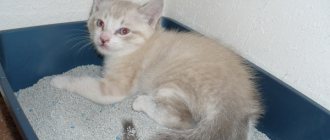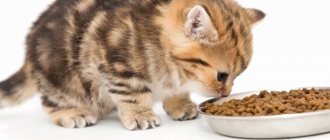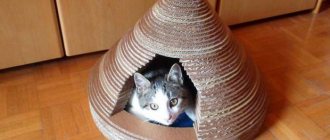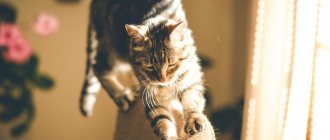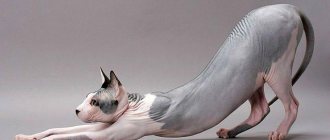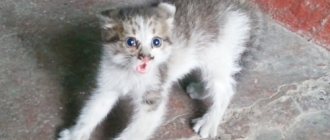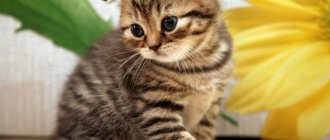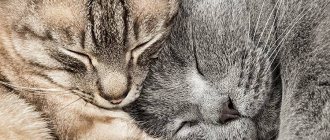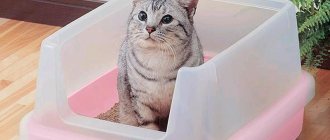Veterinarians warn that if a kitten eats litter, there is a high risk of intestinal blockage and severe intoxication, which can be fatal. To identify the preconditions that provoked an increased interest in inedible objects, the cat should be taken to a doctor. If eating granules is caused by physiological reasons, the cat needs to change the diet and introduce special supplements. As a temporary measure, pet owners should switch to natural cat litter products.
Why does a kitten or cat eat litter?
Among the factors influencing a pet’s inappropriate behavior, there are two large groups: physiological and psychological. Having studied them all, you can understand what prompted the baby to act in this way.
Physiological reasons
The physiological state of a pet is determined by its lifestyle and character traits. Each cat is unique, but you can always identify common reasons that accompany its incorrect behavior:
- Need for vitamins and minerals
. A growing body constantly needs substances to strengthen its claws and teeth. A lack of calcium or phosphorus leads to the fact that the baby, purely intuitively, begins to look for ways to replenish it. In this case, bentonite clay granules are an excellent option.
- Sharpening teeth
. Being predators by nature, cats have an urgent need to sharpen their fangs and claws. The absence of special devices in the form of calcite stones or hard sticks leads to the fact that the animal is forced to sharpen its teeth and claws on hard pebbles from the tray.
- Desire to play
. Little kittens are very curious and playful creatures. They try to find entertainment everywhere. Therefore, the mixture for the tray can also interest them - it rustles and rolls temptingly.
Identifying the reason for eating pellets from the toilet will not be difficult for an attentive and caring owner.
A balanced diet, vitamin and mineral supplements and an abundance of toys and tools for sharpening teeth will help once and for all solve the problem with the behavior of the baby - and even the adult.
Psychological reasons
Eating something inedible has received the name “food perversion” from animal psychologists. This type of behavior is caused by severe or prolonged stress, which leaves a serious imprint on the pet’s lifestyle. Psychological reasons include:
- Repeatedly recurring stressful situation. For example, due to illness, a pet often has to be taken to a veterinary hospital for unpleasant procedures.
- One-time emotional shocks that cause anxiety and nervousness. If a fluffy has recently changed his usual living conditions and found himself in a new family, then eating pellets becomes a kind of “anxiety eating” for him.
Correcting the behavior of a mustachioed friend with mental disabilities is not so easy. The main thing in this situation is not to scold the fluffy, but to calm him down. You can pick him up, stroke him, talk to him peacefully and affectionately. Patience and care will help the animal successfully cope with the psycho-emotional problem.
Is it harmful for a cat to chew litter tray?
Cat litter: which options are best to choose
A few swallowed filler granules will not affect the health and well-being of a small pet in any way. Undigested residues will be eliminated from the body naturally after a short period of time. The fillers do not contain any toxic substances.
Variety of toys for kittens
Potentially hazardous use of clumping litters. The fact is that when they come into contact with moisture, they form a dense lump that can clog the intestines. To save the little kitten, immediate surgery will have to be performed.
Important! Silica gel filler poses a great danger. As mentioned earlier, it readily absorbs moisture, which is why it sticks to the mucous membranes of the internal organs.
What are the dangers of eating pellets?
Most manufacturers do not add any toxic substances to their raw materials. However, eating pellets from a litter tray is not the healthiest activity for a pet of any age. Particles of the mixture stick to the roof of the mouth and the cat's tongue, forming viscous lumps that are very difficult to spit out. This can lead to constipation or suffocation.
Silica gel granules can cause particular harm to health. They have good absorbent properties, and they swell greatly once they are in the animal's stomach. Their presence causes discomfort and can further lead to serious problems in the gastrointestinal tract. The most dangerous consequences are intestinal obstruction or severe poisoning.
Psycho-emotional reasons
Kittens may eat inedible litter out of curiosity. The kids are still immature and are just beginning to learn everything. They can just try the filler on their teeth.
However, if a cat can easily spit out an ordinary toy or piece of paper, the clumping mixture sticks tightly to the palate or tongue. In cats it is very hard, with numerous small protrusions. As a result, animals have to swallow everything that gets into their mouths, including litter.
The cause can be stress in both small and adult cats. Severe discomfort can occur for many reasons - a change of environment, fear, the smell or presence of a dog, moving, etc.
© shutterstock
The fix is easy:
- the animal needs to be provided with maximum comfort and tranquility;
- give the cat more attention and time;
- periodically feed with “snacks”.
This will help correct unhealthy addictions. However, if the above tips did not help, the reason may lie in illness. Only a veterinarian can determine it.
Host actions
You cannot ignore the fact that the kitten ate the litter. This can become a bad habit, which sooner or later will have a negative effect on your pet’s body.
What to do if your kitten eats litter
The first thing the owner should do is pay attention to what type of granules attracted the baby. Sometimes it is enough to consult a veterinarian and introduce multivitamin supplements into the animal’s diet. Eats wood filler? Perhaps there is not enough fiber. Clay - there is a lack of calcium.
Other ways to cope with the problem, especially if it is not food related:
- Buy more toys for your kitten that will help distract and amuse him. Climbing houses, pipes, rustling toys, rattles, wind-up mice - with such an arsenal, the young hunter will forget about boring granules from the toilet.
- Regularly provide special treats or toys for grinding teeth. If the kitten has passed the age of 3-4 months, you can switch it to dry food, which at the same time acts as a simulator for the jaw and fangs.
- Spend more time with your baby, petting him and playing with him. A sufficient amount of communication is the key to a pet’s psychological balance.
- Change the type of mixture. Products made from wood, corn or soy raw materials are safe for cat health.
If all else fails, you should abandon the filler altogether or buy a box with a lattice insert. The granules are poured under the grate, and the animal simply cannot reach them.
An expensive but attractive alternative is a self-cleaning tray or toilet with replaceable cassettes. That is, the model that excludes the use of granular absorbent mixture.
What to do if an adult cat eats litter
You need to find out why an adult cat eats litter by observing your mustachioed friend. Most likely, your pet is experiencing an acute shortage of important microelements. Vitamin and mineral nutritional supplements will help replenish them. The veterinarian will tell you which ones. The mustache may have to undergo tests before prescribing vitamins.
A piece of calcite, which is sold in any pet store, can solve the problem of grinding teeth and claws. Buy one that is intended specifically for cats - analogues for other pets can injure the cat’s oral cavity.
If an adult cat regularly demonstrates inappropriate behavior, then this is regarded as a sign of a serious psycho-emotional disorder. She may be stressed, trying to take revenge or get attention. Advice from a veterinarian or animal psychologist, as well as love and patience from the owner, will help normalize the condition of your furry friend.
Food perversion is also observed when infected with rabies. The behavior of the sick person changes overnight, and he should be isolated from everyone until the diagnosis is confirmed.
When you need help from a veterinarian
If the always active barbel, after eating the contents of the tray, becomes apathetic, lethargic and inactive, then an urgent visit to the veterinary clinic for help is necessary. Among the dangers that await a cat may be blockage of the gastrointestinal tract or poisoning.
Other symptoms you should be wary of:
- profuse drooling – observed with rabies or a foreign object stuck in the throat;
- vomiting and diarrhea - if a filler with chemicals was swallowed, the body will perceive it as poison;
- difficulty breathing and rapid heartbeat are a signal of problems with the cardiovascular system;
- aggressive behavior against a background of painful sensations - occurs when there is a blockage or injury to the gastrointestinal tract, may be accompanied by bloody vomit or feces; Aggression is also characteristic of rabies.
Depending on the complexity of the situation, the veterinarian decides whether to take laxatives or perform surgery to remove foreign bodies.
Some owners use petroleum jelly or vegetable oil to speed up the release of the granules from the body. A few drops of the product are poured into the animal’s mouth through a syringe without a needle and ensure that it is swallowed. After a while, the mustachioed friend has to go to the toilet in a big way. If this does not happen, and the symptoms of illness become more and more, then a visit to the doctor is inevitable.
How to wean
The method of weaning a kitten from eating litter depends on the reason. If it lies in a lack of minerals, it is necessary to review the animal’s diet and purchase vitamin complexes with calcium. You cannot select them yourself! The kitten may develop allergies and hypercalcemia. The complex must be prescribed by a doctor after examining the animal.
In the case when a kitten chews litter in order to sharpen its teeth, you should sometimes give it small hard bones, beef ribs, and tendons. You can buy a stone called “calcite” for your pet. It doesn't bite and sharpens teeth well.
If a cat eats litter due to stress, loneliness, or boredom, you need to provide him with a calm environment and pay more attention. It is advisable to regularly give the animal treats that can bring a lot of pleasure. This will have a beneficial effect on the psyche and distract from unhealthy addictions.
Experienced cat owners advise placing fresh mushrooms in a tray with filler. Its smell will scare away your pet. There is an option to choose a composition for the tray with an unpleasant odor for the cat or cover it with a grill. However, in any case, the kitten must first be shown to a veterinarian. The grate will only block access to the filler, but will not help cure the pet if it is sick with something.
Preventive actions
If a kitten eats a little litter, this is not dangerous to its health, but it may be a symptom of diseases of the digestive tract and you should consult a veterinarian.
If there are no deviations in health, then perhaps the kitten lacks attention and peace of mind. In this case, you need to give more affection and love to your small pet.
Spend time with your pet so that there is no reason for a bad habit to develop.


